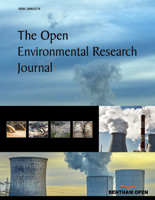- Home
- About Journals
-
Information for Authors/ReviewersEditorial Policies
Publication Fee
Publication Cycle - Process Flowchart
Online Manuscript Submission and Tracking System
Publishing Ethics and Rectitude
Authorship
Author Benefits
Reviewer Guidelines
Guest Editor Guidelines
Peer Review Workflow
Quick Track Option
Copyediting Services
Bentham Open Membership
Bentham Open Advisory Board
Archiving Policies
Fabricating and Stating False Information
Post Publication Discussions and Corrections
Editorial Management
Advertise With Us
Funding Agencies
Rate List
Kudos
General FAQs
Special Fee Waivers and Discounts
- Contact
- Help
- About Us
- Search
The Open Environmental Research Journal
Formerly: The Open Ecology Journal
ISSN: 2590-2776 ― Volume 16, 2023
Note: Average publication time is 18 days between the final acceptance of revised manuscript and its publication
- New Journal Website
- Journal Home
- Editorial Board
- Board Recruitment Workflow
- Instructions for Authors
- Plagiarism Prevention
- Fabricating and Stating False Information
- Research Misconduct
- Post Publication Discussions and Corrections
- Allegations from Whistleblowers
- Advertising Policy
- Short Guide
- Editorial Policies
- Publishing Ethics and Rectitude
- Quick Track Option
- Reviewer Guidelines
- Guidelines for Guest Editors
- Publication Fee
- Publication Cycle - Process Flowchart
- Archiving Policies
- Special Issues
FABRICATING AND STATING FALSE INFORMATION
To ensure the scholarly integrity of every article, Bentham OPEN will publish post-publication notices. The authors of the published articles, or those who have submitted the manuscripts with false information, or fabricated the supporting data or images, will be liable for sanctions, and their papers will be retracted.
Correction Notice
Bentham OPEN will issue a correction notice in case of any correction or omission causing a change in interpretation of the article. This applies to the cases, including mislabeled figures, missing integral funding and/or other information, and authors' competing interests.
There can be major or minor errors/ corrections. Major inaccuracies or omissions may be any changes, which affects the clarity and integrity of an article. Minor errors do not affect the overall meaning of the text.
A separate correction notice will accompany the major errors/ corrections. The correction notice will provide precise details of the mistakes and the revisions/alterations that have been incorporated in the final version.
To rectify the significant error or omission, the Publisher will:
- Amend the online version of the article.
- Issue a separate correction notice that will be connected to the revised version of the article.
- Add a footnote to the article, which will be hyperlinked to the correction notice.
There will be no separate correction notice for minor errors/ corrections. Again, a footnote will be added to the article stating that it has been modified to update the readers. Any decision to issue retraction notice for an article will be taken in accordance with COPE guidelines available at: https://publicationethics.org/files/Fabricated data B.pdf
Correction Notice for Articles in Press
Articles in Press (articles that have been accepted for publication or published as E-pub Ahead of Schedule but which have not been formally published with volume/issue/page information) that include errors, or are determined to violate the publishing ethics guidelines such as multiple submission, fake claims of authorship, plagiarism, fraudulent use of data or the like, may be “Withdrawn” from the journal. Withdrawal means that the article files are removed and replaced with a PDF stating that the article has been withdrawn from the journal in accordance with Bentham Open Editorial Policies.
Copied Submission and Redundant Publication
Bentham OPEN journals ensure that the research work is original and unpublished electronically or in print. Only research that represents original work or a thesis available on a preprint server, and is not published anywhere else is considered.
Bentham OPEN journals only cater to those articles which are not submitted elsewhere for publication at the same. Those authors who have made simultaneous submissions may be liable to penalty. The authors must cite the previous research work and specify how their submitted manuscript varies from their previous articles. The authors will be asked to provide a reference for their earlier research work, published or under review in order to meet the criteria of manuscript submission. In case of the author uses his own text from the previous publication other than the Methods section, then it should be mentioned in the text. Consent from the copyright holder must be required in cases where the authors reuse figures or a considerable number of words.
For the projects presented at conferences, Bentham OPEN will consider the extended versions of the manuscripts provided this is declared in the cover letter. Furthermore, the article should have the previous version cited and mentioned, and there is unpublished and original content, and any necessary permissions have been obtained.
The redundant publication refers to the publication of the same data more than once, resulting in rejection or a request to merge the submitted manuscripts and the rectification of published manuscripts. Seriously flawed or misleading content (plagiarised publication) may cause retraction of the article, and the authors may be penalized.
Manipulation of Citations
Authors with the aim just to increase the number of citations to a given author’s research work or the manuscripts previously published in a particular journal may result in sanctions for the author. Similarly, the editors and reviewers should not encourage authors to add references just to increase citations to their own or an associate’s work, to the journal, or to another journal they are associated with.





